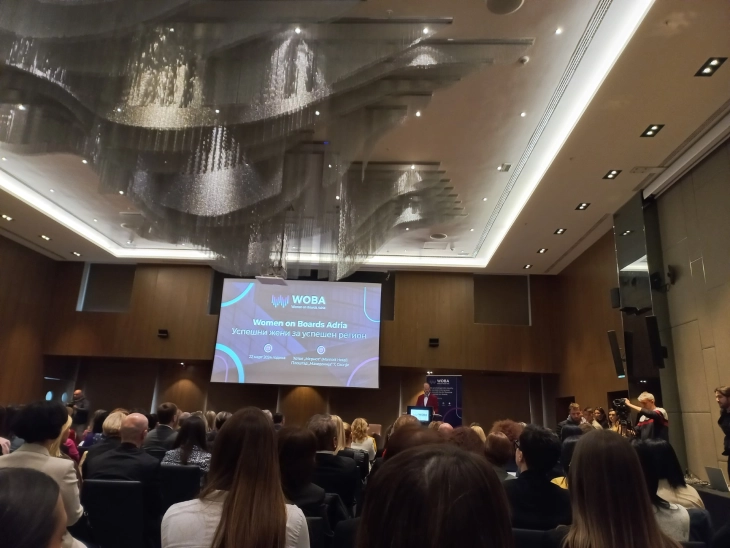Intersectoral approach and partnerships for gender equality and women’s empowerment: conference
- Gender equality and empowering women require intersectoral approaches and partnerships between the public sector, the business sector and civil society. Cultural norms, prejudices, structural inequalities are still significant barriers that discourage women from aiming for leadership positions, concluded the speakers at Friday’s conference – “Successful Women for a Successful Region” organized by Women on Boards Adria (WOBA).
- Post By Angel Dimoski
- 17:05, 22 March, 2024

Skopje, 22 March 2024 (MIA) – Gender equality and empowering women require intersectoral approaches and partnerships between the public sector, the business sector and civil society. Cultural norms, prejudices, structural inequalities are still significant barriers that discourage women from aiming for leadership positions, concluded the speakers at Friday’s conference – “Successful Women for a Successful Region” organized by Women on Boards Adria (WOBA).
First Lady Elizabeta Gjorgievska said the obstacles that prevent women from reaching the highest levels in business usually stem from the historical norms regarding the role of women and their assigned roles, shaped by patriarchal cultures.
Gjogievska stressed that despite the commitments to break the glass ceiling, work should be done to encourage women to have equal starting positions with men.

“Female leadership doesn’t only mean greater representation of women in numbers. Female leadership means reform of the way the processes are managed. The inclusion of more women in managing boards means the inclusion of new dimensions in leadership – creativity, dynamism, better communication, empathy, faster solutions to complex problems. Statistics also confirm that inclusive corporate boards have far better performances than those that are predominantly male. Women are more prepared to listen, to build strong bonds founded on understanding and respect. Their ability to empathize with the needs of others and their tenacity when facing difficult challenges make them the perfect candidates that would be open to non-conventional solutions and expert opinions in the management bodies,” said Gjorgievska.

The Deputy Prime Minister in charge of economic affairs, Fatmir Bytyqi, stressed that despite the significant progress in recent years, women continue to face systemic barriers that obstruct their progress in the workplace.
“With the exclusion of women from corporate boards, we are creating an environment where the talent and potential of women are unfairly neglected, i.e., discriminated. We have an obligation to take down these barriers and encourage an inclusive culture where every individual, regardless of their gender, has equal opportunities for progress. Accepting gender diversity is not only a moral imperative, but is also a smart economic decision,” said Bytyqi.

The United States Ambassador to North Macedonia, Angela Aggeler, stressed that women continue to face unequal circumstances in the workforce and daily life.
“Although we’ve seen progress in recent years, both in the United States and in North Macedonia, women continue to be underrepresented in leadership positions in the public and private sectors. We need to include more diverse viewpoints if we wish to unlock the full potential of our societies and economies. However, women cannot make progress alone. The reality is that women continue to confront unequal circumstances in the workforce and in our everyday lives. So, today I urge you also to call upon allies, those with whom we can take action together for greater equity and thus greater success. None of us is in this alone,” the Ambassador said.
The European Union’s Deputy Head of Mission to North Macedonia, Ben Nupnau, highlighted the fact that the participation of women is a driver of growth and innovation.
“While gender equality is a core principle of the EU, it is far from reality. In business, politics and society as a whole we can only reach our full potential if we use all of our talent and diversity. Using only half of the population, half of the ideas and half of the energy is not good enough. In 2020, the EU adopted its Gender Equality Strategy to close gender gaps in the labor market participation, in pay, in pensions, to close the gender care gap and achieve gender balance in economic and political decision-making. Back then, women earned on average 16 percent less than men did, and only eight percent of CEOs of the EU’s largest companies were women. The Strategy has hence been the basis for all policies and measures taken by the EU to achieve our commitment to a Union of equality,” Nupnau said.
Photo: MIA







